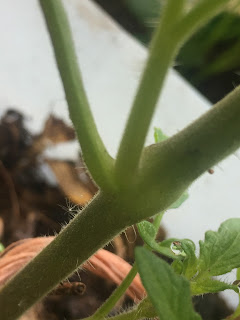Tomatoes to Market: Mission Mondays and STEAM of a different sort
 Two weeks ago we decided that we should have themes and an overall goal for what we are doing where continuity is key. We are focusing on monthly themes and this month's theme is Civic Duty. This month we were able to donate lots of food to those in need and do some work within our local community.
Two weeks ago we decided that we should have themes and an overall goal for what we are doing where continuity is key. We are focusing on monthly themes and this month's theme is Civic Duty. This month we were able to donate lots of food to those in need and do some work within our local community.We wanted to do something larger than the farm and focus on themes for our students that go beyond just growing things. We have asked the question before what are we going to do with what we are growing and for this month especially, the theme being civic duty, how can we use what we are growing and learning to make a difference?
As part of our mission, we have been doing community cleanup and collecting aluminum cans to be recycled with the focus on doing more and get our students to engage in their community. The community is getting cleaner. Do we have the potential to do more?
What are we learning and teaching on the farm.
From STEM to STEAM.
Science Technology Engineering Art Mathematics or STEAM adds another element of Art to the STEM model.
Using the farm as a platform we asked our kids to look at what they are learning and how all of the things that we are doing on the farm ties into what they need to know as part of their education.
Our kids are developing areas of expertise and interest. We are working to help them explore those interests and develop their expertise. So this month we asked them what they learned, how they were able to learn these things from the garden and our program.
Marnie (age 9) (Doraville, GA) This month,we talked about what we are going to do with all of our tomatoes. The S and R Farm grew 40 pounds of tomatoes. We could not sell a lot of them this month so we gave them to the Saint Vincent De Paul food bank. Next month we will be working on a video of the farm. I like art and photography and I am happy to have lots of really interesting things to take pictures of in the garden. I am happy that we could help some people who need food.
Elaynia (age 9) (Seattle, WA) This month we worked on the theme of civic responsibility. We were able to work with other students my age in Georgia to grow lots of vegetables. I like that we can talk to people in Georgia because I have never been there. It is interesting to meet new people and work with them to help people. We used technology to all talk to each other on line about what we are doing and communicate with each other through social media.
Keshia (age 9) (Doraville, GA) This month we grew tomatoes. I was able to take some home to my family. We made tacos and used the tomatoes we grew to put on top. I only see tomato vines at my grandmother's house and it was good to see them growing here and know that I helped. We are learning to grow food in containers so that I can have plants at my apartment.
Devan (age 8) (Doraville, GA) This month, we grew tomatoes. I worked with Dr. Montgomery to create a design for the fall greenhouse. We were able to create a design that used things we could find around Doraville and save from the local landfill. It is important to think ahead. It is important to be prepared because soon the summer will be over and the fall will be right behind. We are building the greenhouse under the mimosa tree in our school yard because in the fall and winter, the leaves will be gone and the light will be brightest there. The bright light from the sun will keep the plants warm even if it is cold outside.
 |
| Oyster Mushroom Mycelium |
Avery (age 9) (Seattle, WA) This month I worked with Lucas and Dr. Montgomery on how to grow mushrooms. We learned that they are not plants. They are fungi. Fungi are single celled organisms that feed off of organic matter. The Oyster Mushroom is one of the most popular kinds. We are going to see how we can grow them on a regular basis and how to keep them going through the fall and winter. It is interesting to talk to people from different places.
 |
| Arduino Controller |
We are very proud of our students and the work that they are willing to do with us over the summer.
If you would like to know more about what we are doing you can find more on Instagram, and Facebook
To make a donation to Sunlight and Rainwater Farm, Donate Here!



Comments
Post a Comment